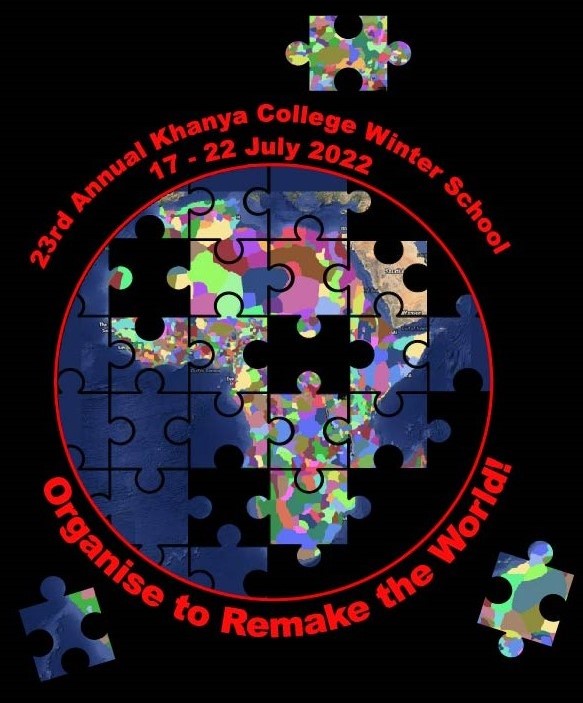Dear Cdes
All too soon we have come to the close of the 23rd Winter School, a wonderful and inspiring experience for all of us at Khanya College. As Khanya analyzed the generalized decay and destruction in South Africa under the ruling party’s neoliberalism, we were aware of the need to organize the youth, a new generation and a new cadre to ‘remake the world’.
At the end of 2019 we planned to deepen our work with the youth, the most talented and yet neglected section of South African society. In South Africa, and internationally, the youth have historically lifted the struggles of oppressed people and challenged the way we understand the world. In March 2020 the Covid-19 pandemic disrupted our plans and our lives, but thankfully we started to regroup in 2021.
This year we celebrate our most youthful school with over 70% under 35 years, and over 60% being young women. The school has been energetic, yet warm, engaging and respectful. There has been sharing, laughter and open intergenerational debate. Most of all, one has been struck by the understanding that participants have of the social inequalities in South Africa and their causes. Participants have also indicated insights into the challenges facing the working class, organizing and its organizations. The School’s popular methodologies, especially theatre, have had tremendous success and demonstrated that we need to rely on our imagination and ourselves as our primary resource.
We cannot build strong organisations without building strong cadres, and vice versa. Participants created ‘trees’ and identified the important values and attributes needed to build strong organisations and strong cadres to overthrow capitalism peacefully. In our next phase of struggles, we will grow a forest of trees, of organisations and cadres. We need to strengthen our self-education and our study groups.
We remember the youth who died in the Enyobeni Tavern tragedy, and the lives of so many youths who die needlessly because of neoliberalism and social inequality in South Africa, and who will never know or realize their talents. We need to support the schools in the Eastern Cape who have marched against the Enyobeni tragedy and also mobilize against the government’s permission of sale of alcohol in schools.
The struggle against the impact of alcoholism has been an historical and international struggle of, and for, the working class. Known as the ‘Temperance Movement’, the movements were in many cases initiated by women, and led to widespread mobilisation of churches and civil society, to preserve and prevent the destruction of the working class. The debate at the School raised important issues for us about the position and role of alcohol in the destruction of communities, family households, organisations and the lives of youth (and adults).
We need to mobilize and pressure the government for amongst others: the need for free education opportunities for youth, meaningful jobs and apprenticeships for youth, recreational facilities so our youth can realize their talents; and free training and stipends for youth to pursue careers in the arts. Most importantly, our youth need to learn from the 1976 Student Uprisings and organize themselves.
As we pay tribute to Oupa Lehulere’s work, the late coordinator of Khanya College, we value what he has built selflessly. Socialism is not about “freedom in our lifetime”, but rather “for those who come after us”. Oupa was exemplary and enjoyed the life of struggle that he chose. I have no doubt that his spirit was with us in this first school without him, and that he would have thoroughly enjoyed the school.
I have no doubt that our hope for a bright future lies in the hands of the youth, a new generation, a new cadre, who understands the world and are prepared to struggle to achieve it. Only a new cadre will lift our struggle selflessly and ‘remake the world’ for the working class and everyone in society.
Aluta continua!
This article was submitted as part of the Imbila Yesu publication produced daily for the duration of the Winter School in 2022 (17-22 July 2022). It appeared in Edition No. 1, released on 22 July 2022.
You may republish this article, so long as you credit the author and Karibu! Online (www.Karibu.org.za), and do not change the text. Please include a link back to the original article.


 Download PDF
Download PDF